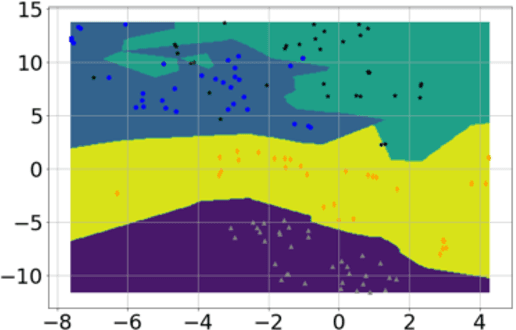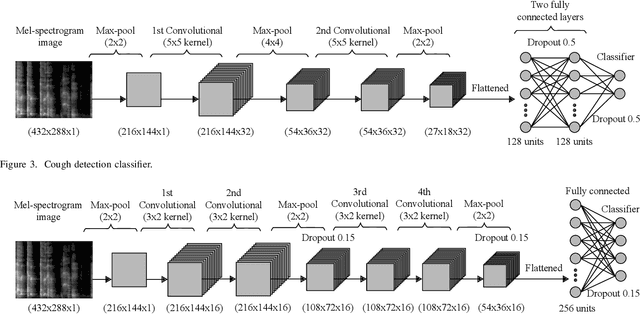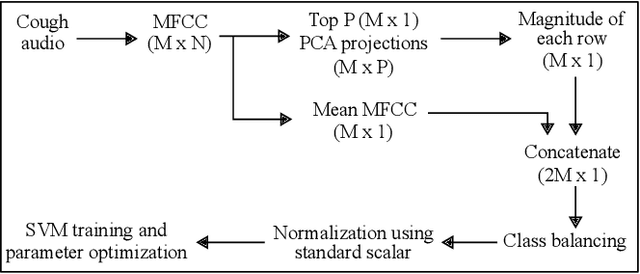Haneya N. Qureshi
An AI-enabled Bias-Free Respiratory Disease Diagnosis Model using Cough Audio: A Case Study for COVID-19
Jan 04, 2024



Abstract:Cough-based diagnosis for Respiratory Diseases (RDs) using Artificial Intelligence (AI) has attracted considerable attention, yet many existing studies overlook confounding variables in their predictive models. These variables can distort the relationship between cough recordings (input data) and RD status (output variable), leading to biased associations and unrealistic model performance. To address this gap, we propose the Bias Free Network (RBFNet), an end to end solution that effectively mitigates the impact of confounders in the training data distribution. RBFNet ensures accurate and unbiased RD diagnosis features, emphasizing its relevance by incorporating a COVID19 dataset in this study. This approach aims to enhance the reliability of AI based RD diagnosis models by navigating the challenges posed by confounding variables. A hybrid of a Convolutional Neural Networks (CNN) and Long-Short Term Memory (LSTM) networks is proposed for the feature encoder module of RBFNet. An additional bias predictor is incorporated in the classification scheme to formulate a conditional Generative Adversarial Network (cGAN) which helps in decorrelating the impact of confounding variables from RD prediction. The merit of RBFNet is demonstrated by comparing classification performance with State of The Art (SoTA) Deep Learning (DL) model (CNN LSTM) after training on different unbalanced COVID-19 data sets, created by using a large scale proprietary cough data set. RBF-Net proved its robustness against extremely biased training scenarios by achieving test set accuracies of 84.1%, 84.6%, and 80.5% for the following confounding variables gender, age, and smoking status, respectively. RBF-Net outperforms the CNN-LSTM model test set accuracies by 5.5%, 7.7%, and 8.2%, respectively
AI4COVID-19: AI Enabled Preliminary Diagnosis for COVID-19 from Cough Samples via an App
Apr 16, 2020



Abstract:Inability to test at scale has become Achille's heel in humanity's ongoing war against COVID-19 pandemic. An agile, scalable and cost-effective testing, deployable at a global scale, can act as a game changer in this war. To address this challenge, building on the promising results of our prior work on cough-based diagnosis of a motley of respiratory diseases, we develop an Artificial Intelligence (AI)-based test for COVID-19 preliminary diagnosis. The test is deployable at scale through a mobile app named AI4COVID-19. The AI4COVID-19 app requires 2-second cough recordings of the subject. By analyzing the cough samples through an AI engine running in the cloud, the app returns a preliminary diagnosis within a minute. Unfortunately, cough is common symptom of over two dozen non-COVID-19 related medical conditions. This makes the COVID-19 diagnosis from cough alone an extremely challenging problem. We solve this problem by developing a novel multi-pronged mediator centered risk-averse AI architecture that minimizes misdiagnosis. At the time of writing, our AI engine can distinguish between COVID-19 patient coughs and several types of non-COVID-19 coughs with over 90% accuracy. AI4COVID-19's performance is likely to improve as more and better data becomes available. This paper presents a proof of concept to encourage controlled clinical trials and serves as a call for labeled cough data. AI4COVID-19 is not designed to compete with clinical testing. Instead, it offers a complementing tele-testing tool deployable anytime, anywhere, by anyone, so clinical-testing and treatment can be channeled to those who need it the most, thereby saving more lives.
 Add to Chrome
Add to Chrome Add to Firefox
Add to Firefox Add to Edge
Add to Edge